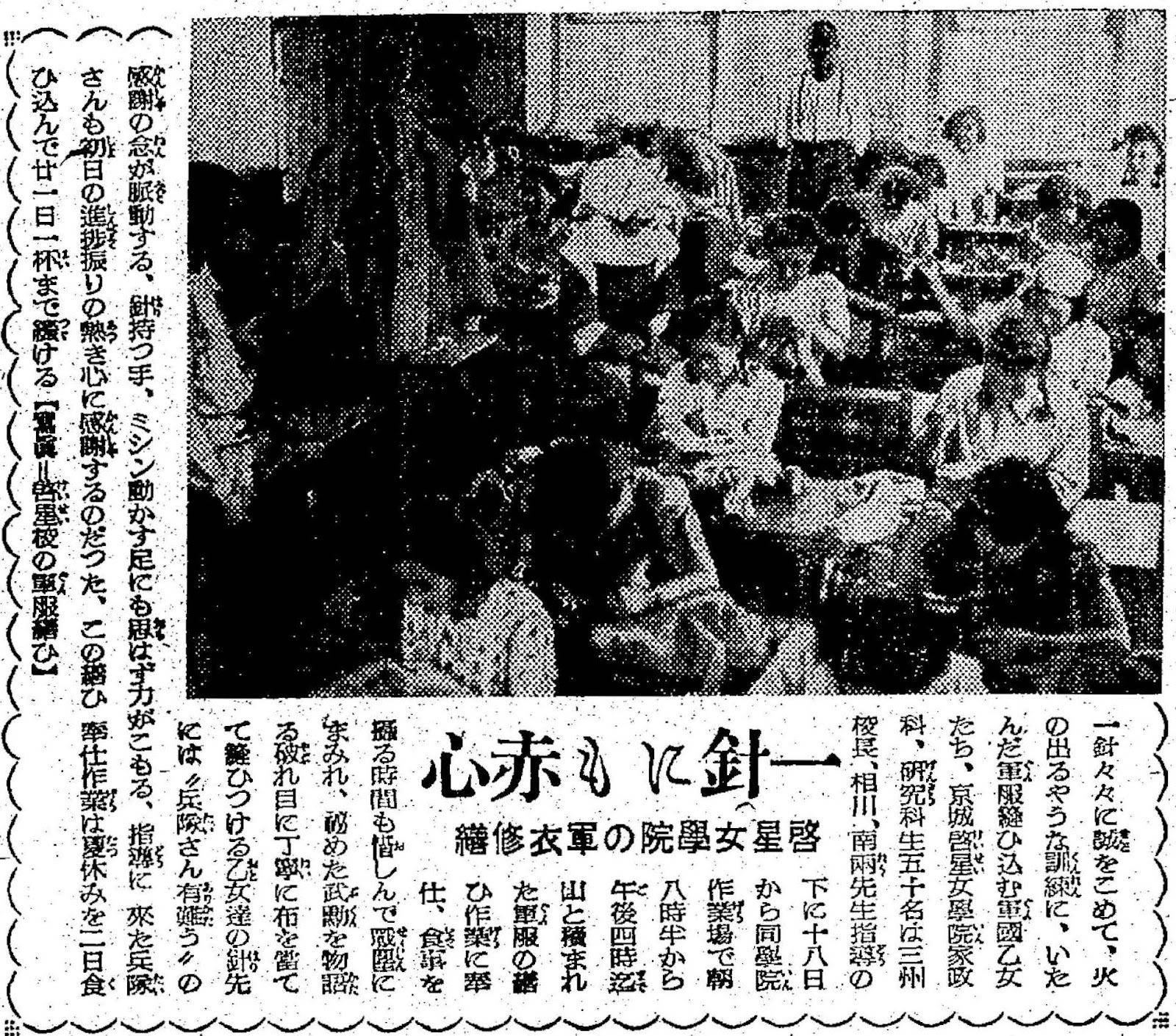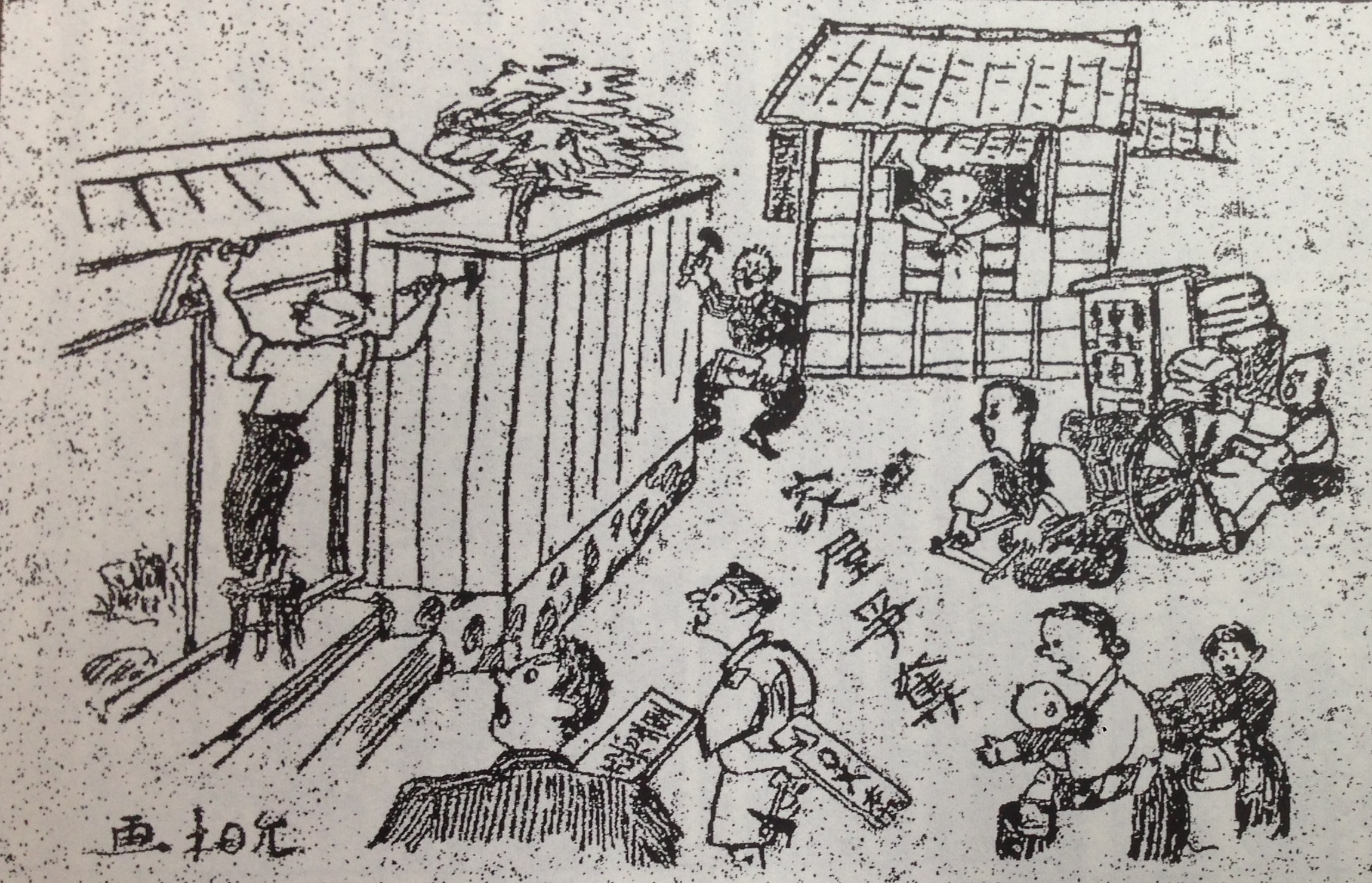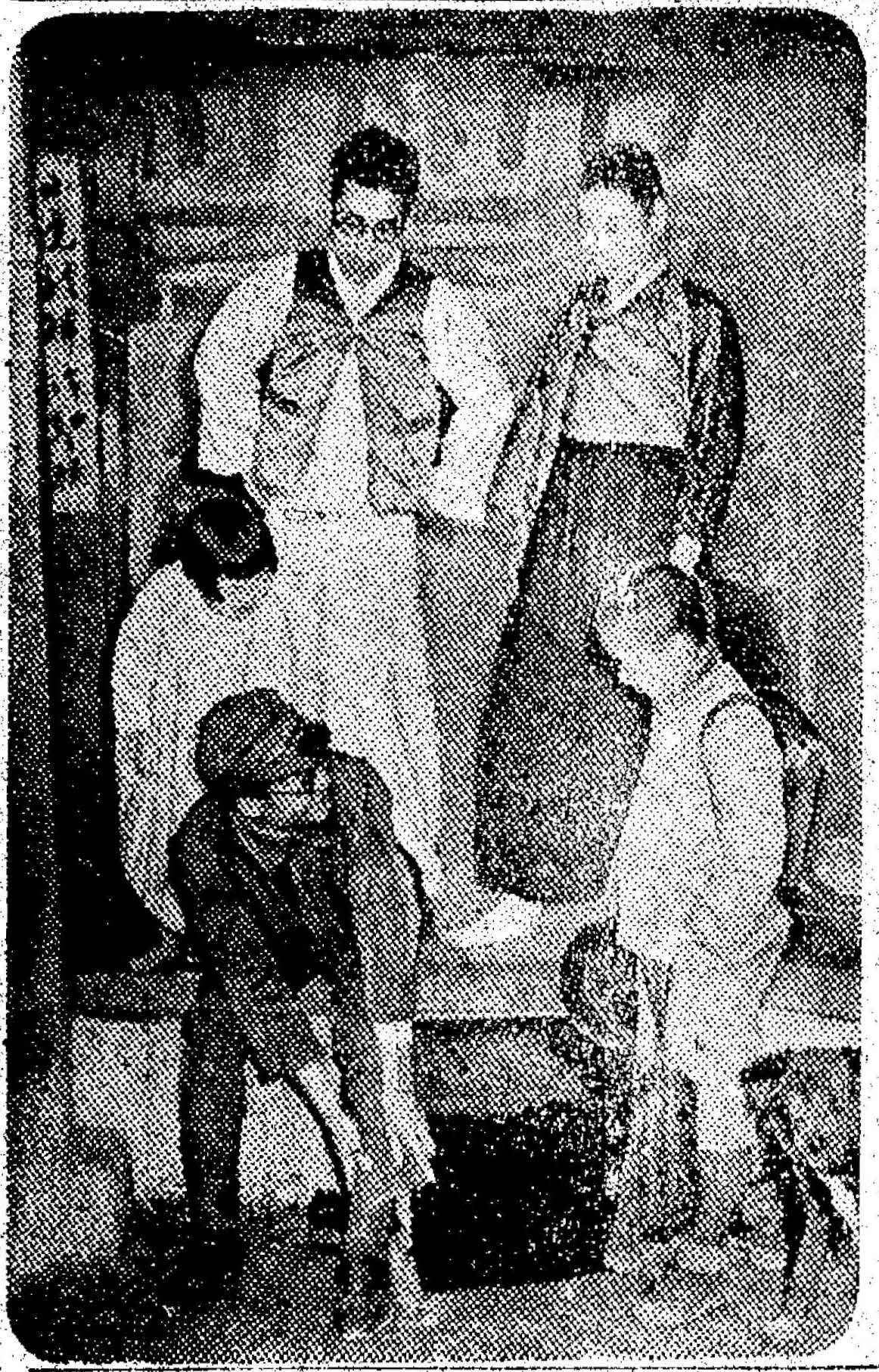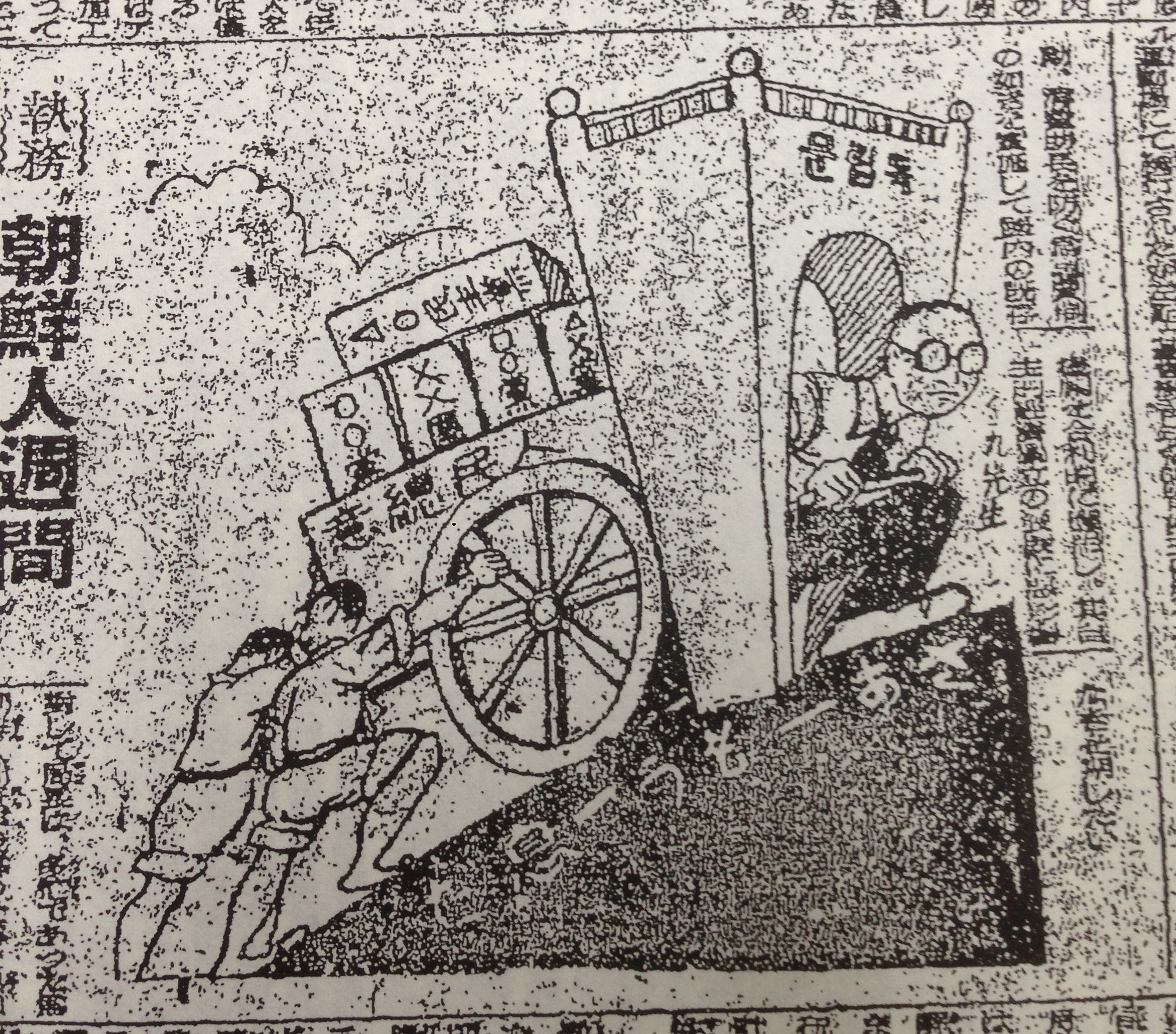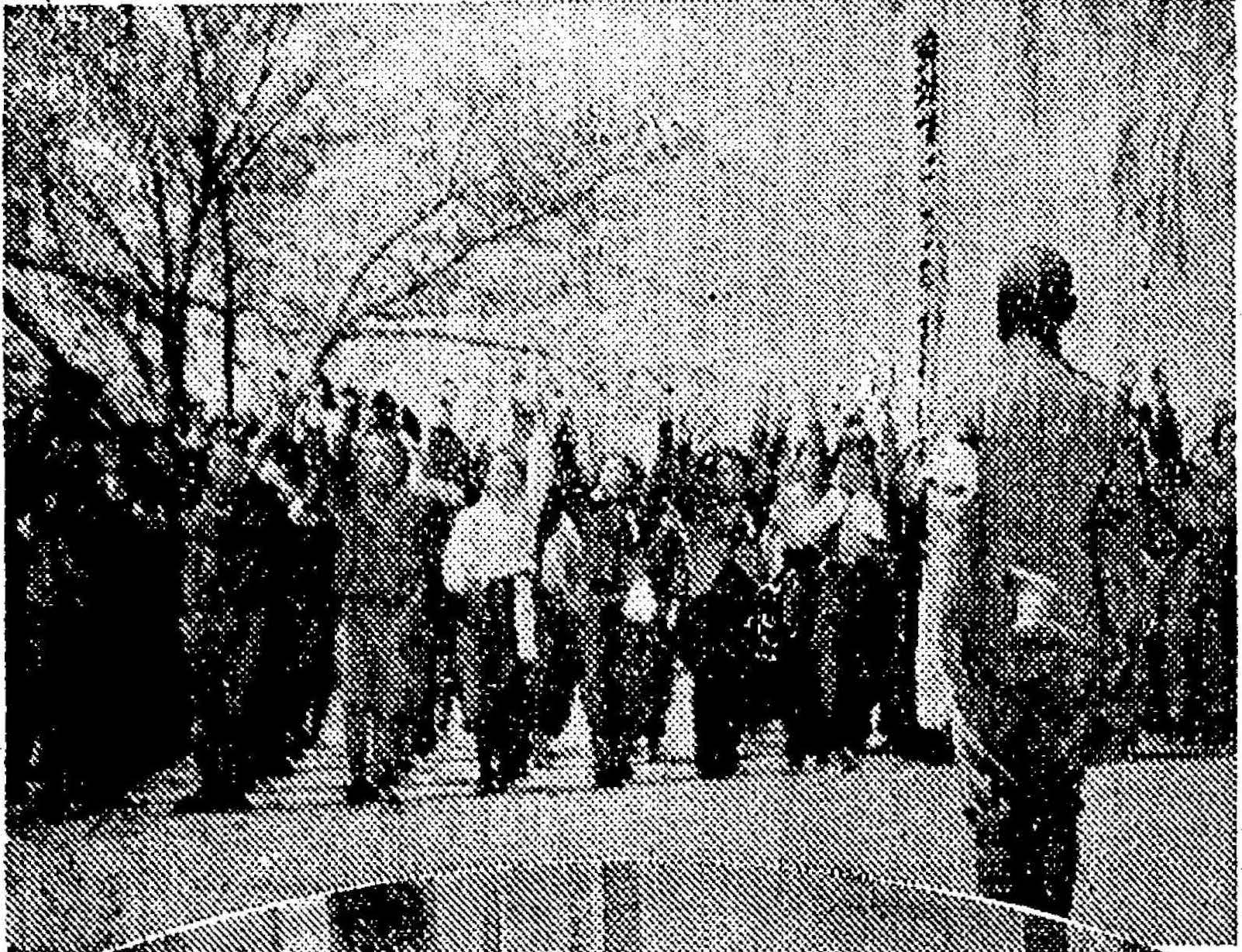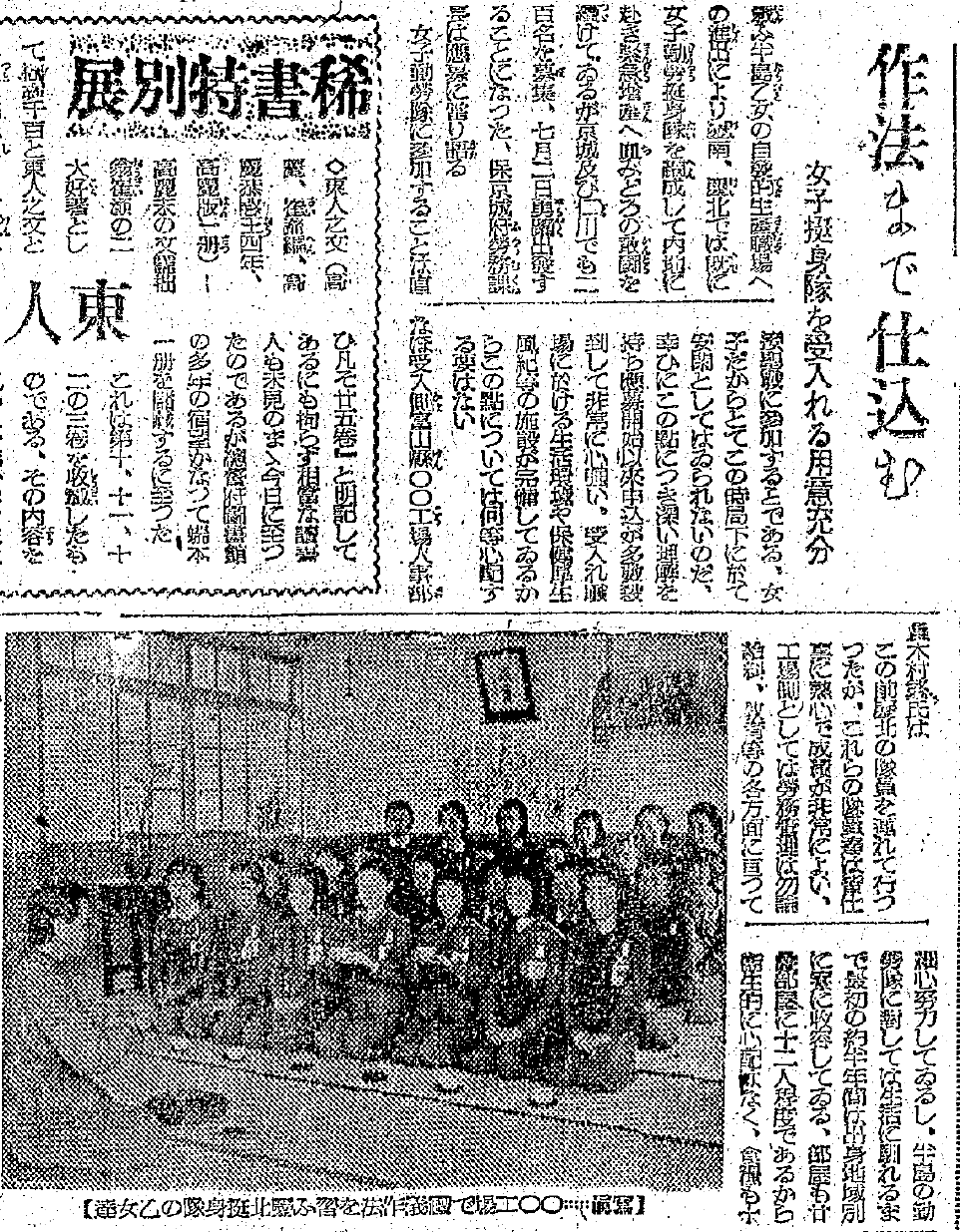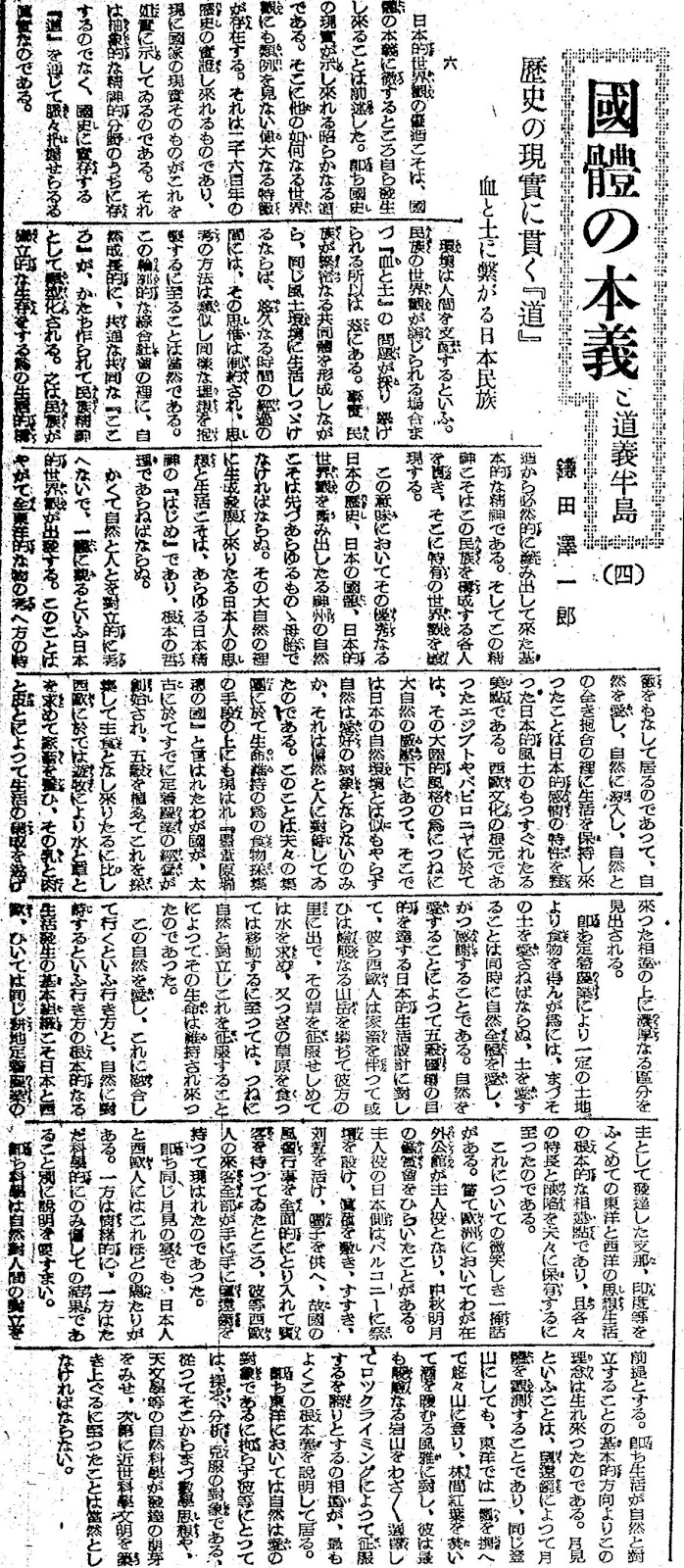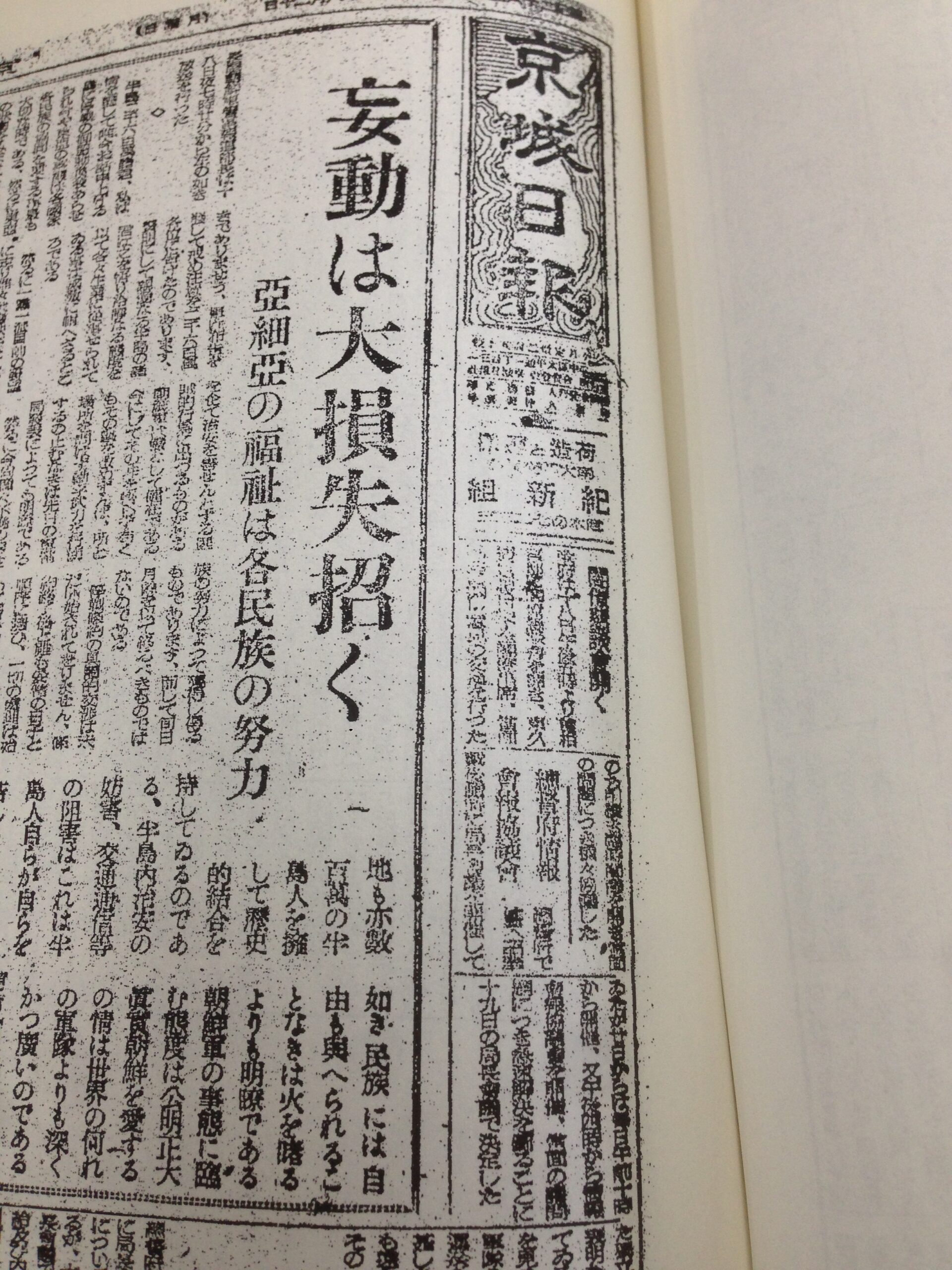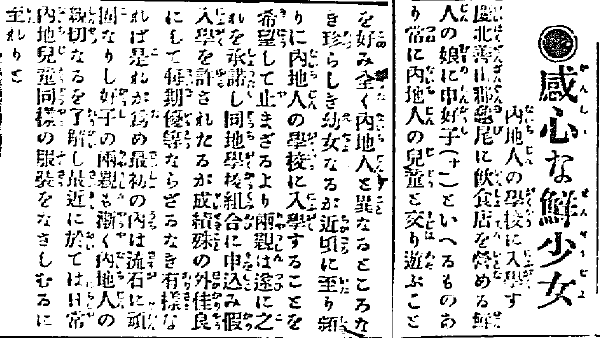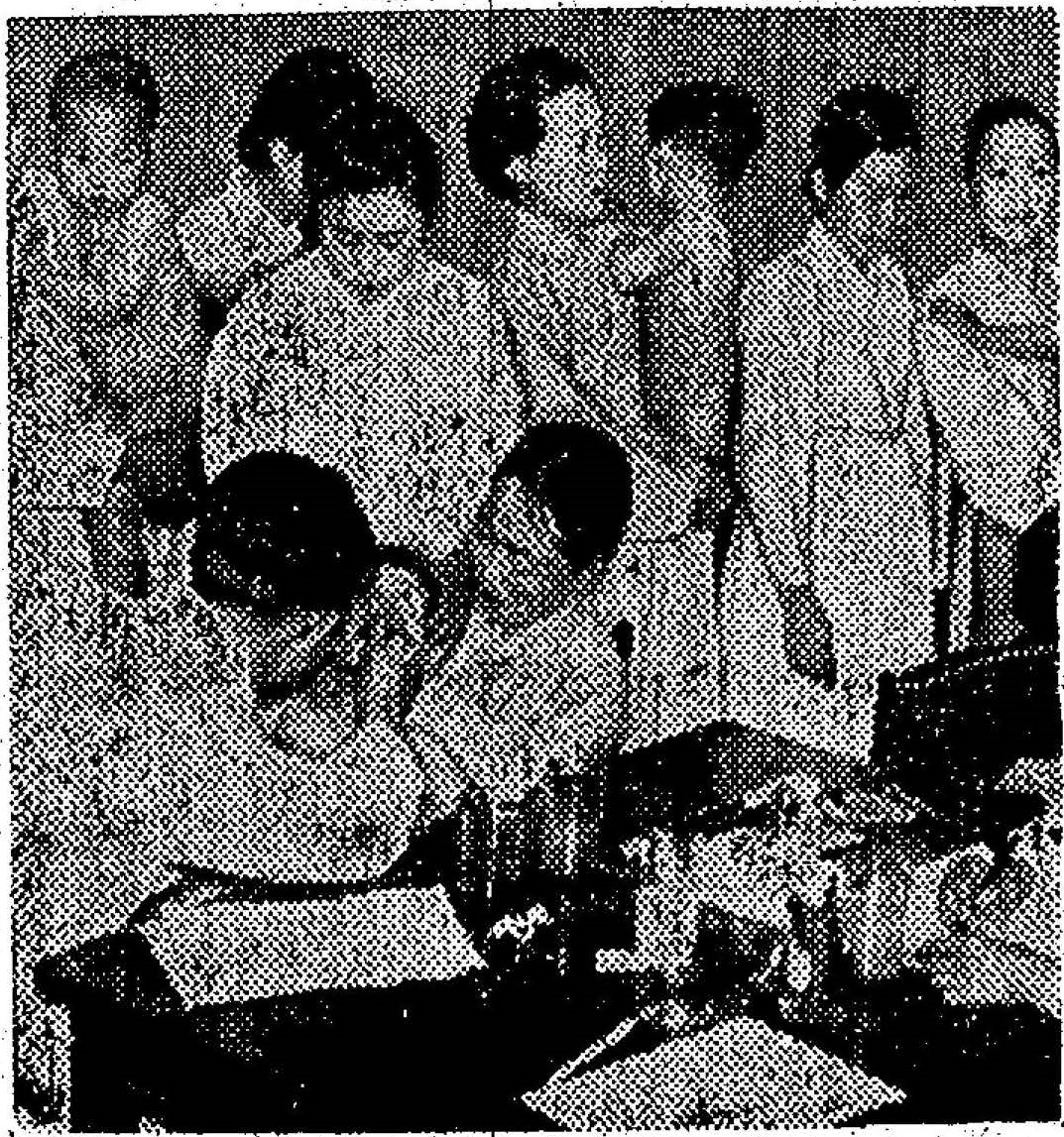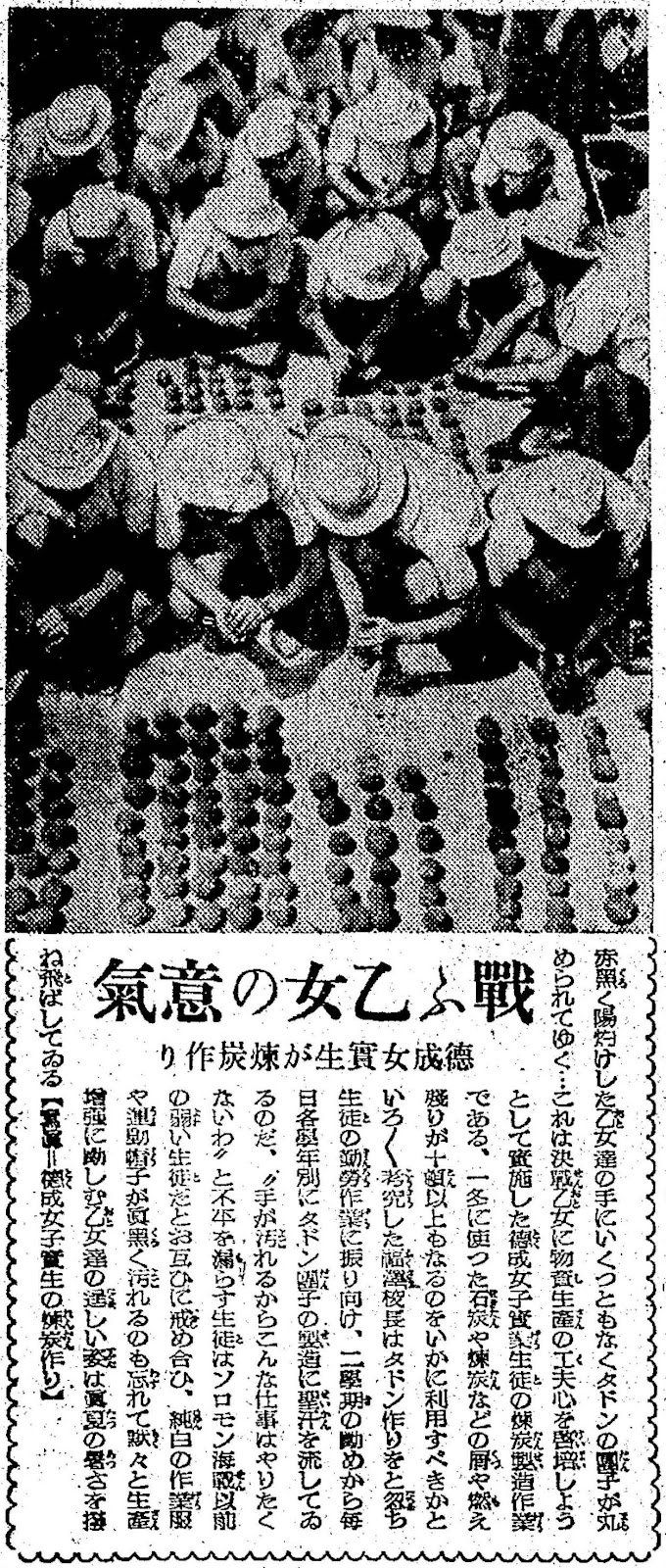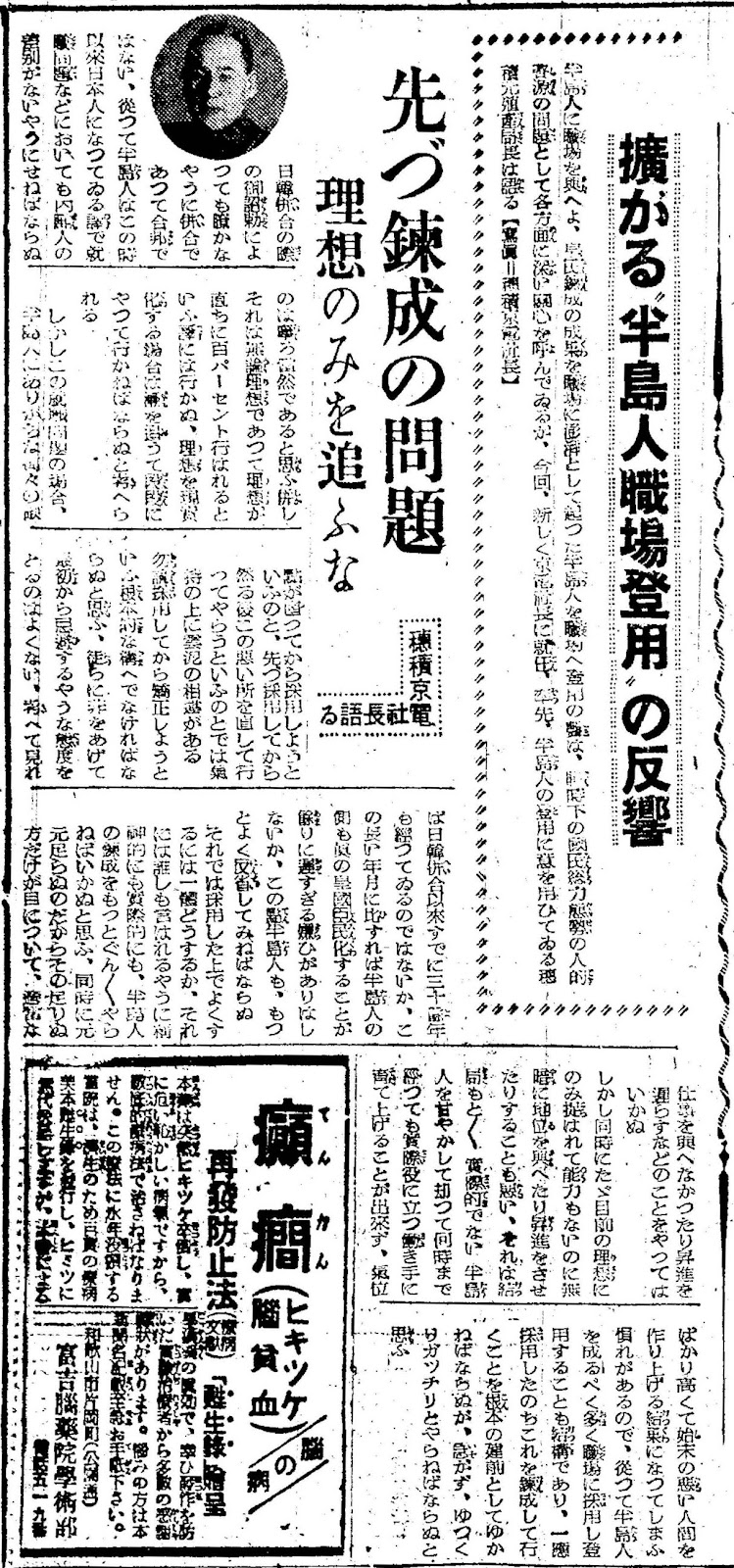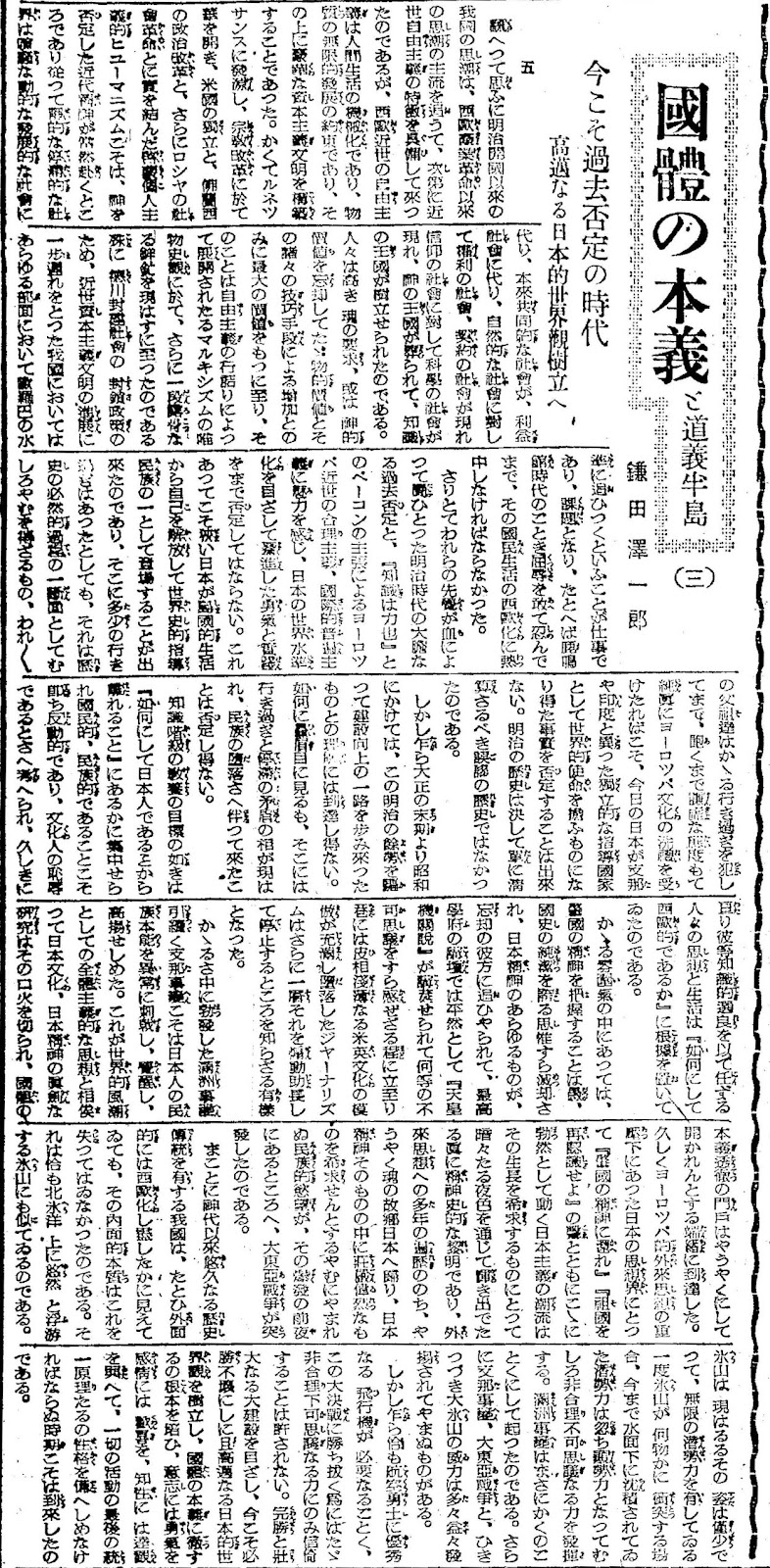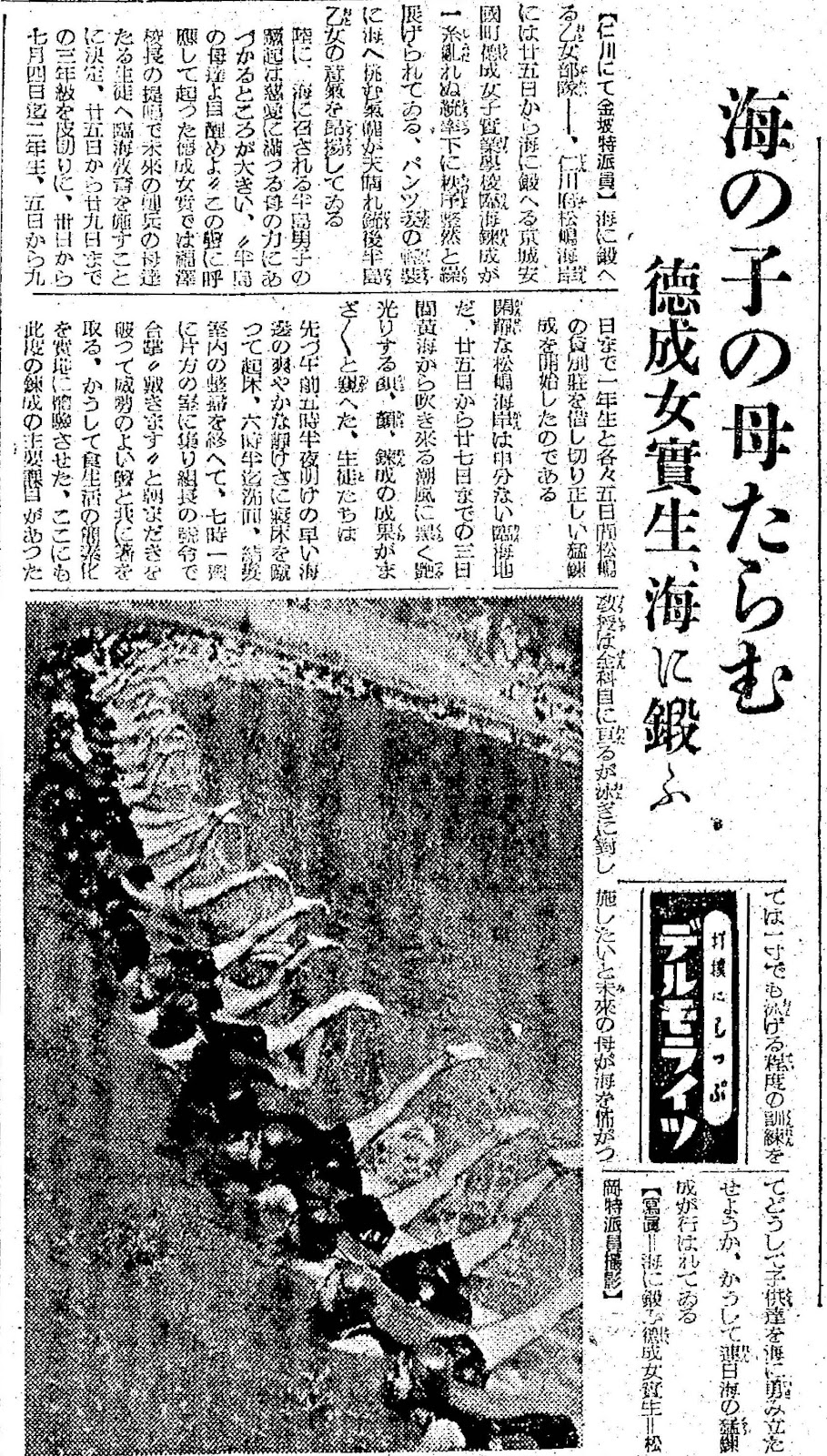
Korean schoolgirls attend a five-day swimming camp at Songdo, Incheon in the summer of 1943, learning to become “healthy mothers of Japan the Oceanic Nation”
(Notes)
Duksung Women’s Vocational School was also featured in two other articles previously featured in this blog: this one from August 22, 1943 where the students make improvised coal balls from coal scraps, and this one from January 10, 1943 where it is revealed that the Principal Fukuzawa of the school is a Korean woman, and her portrait is featured. Apparently, Ms. Fukuzawa loved to show off her students to the press. The July 4, 1943 article calls the principal Tomizawa (富沢), but I think this is a typo, since she is referred this way only once, and it is very plausible that the type setter made a mistake since the character for Fuku (福) in Fukuzawa is very similar to 富.
The swimming instructor was named Kanemitsu (金光) – there is a good chance this instructor was also ethnic Korean, because Korean people named Kim commonly adopted Japanese surnames incorporating the Chinese character 金. Thus, it is plausible that all the people mentioned in these four articles were ethnic Korean.
Songdo, where the swimming camp was located, is now the site of the Songdo International Business Development District in Incheon.
Again, I would like to emphasize that I do not post this content to glorify Imperial Japan, but rather to combat the resurgence of nostalgia for Imperial Japan by exposing it, as I explain in my blog post here.
(Translation)
Gyeongseong Ilbo (Keijo Nippo) June 28, 1943
We will be mothers of children of the ocean
Duksung Women’s Vocational School students training at sea
[Correspondent Kim Ba in Incheon] A battalion of maidens is training in the ocean. The ocean training of the students of Duksung Women’s Vocational School of Anguk, Seoul started on June 25th and is being conducted in an orderly fashion under the unbroken leadership of the school. The spirit of the girls, who dressed lightly in underwear and took on the challenge of going to the sea, is uplifting the spirits of Korean maidens on the home front.
The rising to action of the Korean boys, who are called to serve on land and in the sea, owes much to the power of their loving mothers. “Wake up, mothers of the Korean peninsula!” In response to this call, Duksung Women’s Vocational School decided to provide seaside education to the students, who would become the mothers of healthy soldiers, under the advocacy of Principal Fukuzawa. They rented a villa in Songdo for five days at a time to begin their intense training. The third year students are to rotate in from June 25 to June 29, the second year students are to rotate in from June 30 to July 4, and the first year students are to rotate in from July 5 to July 9.
The quiet coast of Songdo is a perfect seaside resort. For three days from June 25 to June 27, the sea breeze blowing from the Yellow Sea made their tanned faces shine, and the results of their training could be clearly seen.
The students first got up at 5:30 a.m. in the refreshing silence of the seaside at the early dawn, awoken by kicks to their beds. By 6:30 a.m., they were done washing up, tying up their hair, and cleaning up their rooms. At 7:00 a.m., they gathered in one side room, and at the command of the head of the group, they picked up their chopsticks and, to break silence of the early morning, shouted with a vigorous voice saying, “Itadakimasu!” (a customary Japanese phrase of gratitude which is said before meals). In this way, they experienced firsthand the simplification of their eating habits. Here, there was a major lesson to be had for this training. There were teachers for all the subjects, but for swimming, they wanted to give the students training to the extent that they could swim even a little bit. After all, if the mothers of the future fear the ocean, how could their children ever stand valiantly in face of the ocean?
Thus, day after day, they train intensely in the ocean.
[Photo: Duksung students training in the sea: photo by correspondent Matsuoka]
Source: https://www.archive.org/details/kjnp-1943-06-28
(Translation)
Gyeongseong Ilbo (Keijo Nippo) July 4, 1943
Korean women training in the ocean
The flag of the Imperial Navy is flying in the Pacific Ocean and the Indian Ocean, and the history of maritime men is culminating in a brilliant autumn. The Korean peninsula is now joining the traditional “display of the sea” with the implementation of the special volunteer conscription system of the Imperial Navy.
Although the Korean peninsula has had a history of a couple of maritime experiences in the past, its affinity for the sea has been extremely limited, and only a few seaside people know how to swim. Most of the people have turned their backs on the sea.
The sea is vast and inspires majestic growth and development. Sea battles to build a New East Asia are being intensely fought repeatedly, day after day. The sea! The time has come to send the young people of the Korean peninsula to that sea. In order to send our young people to the sea, all of our Korean compatriots must directly confront the sea. All of them should know the sea, become familiar with it, and come to experience it like it is their front yard.
High enthusiasm for the blue sea. One school for women plunged into that sea. This was Seoul Duksung Women’s Vocational School. The following is a report on the “seaside training” which began on June 25. Let’s hear the footsteps of the young women conducting a military march towards the sea. [Photo: Training Center in Songdo, Incheon for the students of Duksung Women’s Vocational School]
Never be afraid of the Pacific Ocean
Going to the training ground to cultivate the boiling fighting spirit
Now to the sea! The sea! The spirit of living with the sea has spread like a tidal wave to every corner of Korea. Japan stares out at the world’s oceans. The Governor-General’s Office called on the young men of the Korean peninsula to train in the ocean, so that Korean men, who form one wing of Japan, could also grasp the sea.
The Korean Federation of National Power (the one and only political party of Japan-colonized Korea) has also started to promote swimming among the youth, especially among adult men of military age, during the summer training season. In response to this call, the women who are to be mothers were urged to “understand the sea”. In order to nurture the spirit of the motto, “Mothers, never fear the sea, for the sea is the cradle of our children,” the “seaside training” was implemented at Songdo, Incheon with the Duksung Women’s Vocational School, ahead of its implementation in other women’s schools across all of Korea.
Starting with 176 students of the third year on June 25, followed by the students of the second year, and then the students of the first year in this order, every student in the entire school without exception is participating in five day periods grouped by academic year, turning to the sea saying “Well then, we should first definitely study the ocean”.
It is said that it took a great deal of effort to obtain the approval of the parents prior to the implementation of the program. Some parents even formally expressed their opposition. However, they say that Principal Tomizawa’s conviction and enthusiasm as a leader were instrumental in persuading them to go through with it.
She said, “Under the current circumstances, it is essential for not only boys but also girls and children to become familiar with the ocean. The best time to do this is when they are in girls’ school, and it is not possible to do this at home. If the mother of a child who is going to conquer the sea in the future is afraid of the sea, what’s going to happen?” This ardent persuasion was repeated several times.
What does it tell us about the fact that this opposition came from many families of the upper class? It is appalling to hear this kind of opinion from an official who should be leading the way. This project also has the function of making the people leading complicated lives on the Korean peninsula, adhering to the old customs, more prepared for decisive battles, and it also aims to provide guidance in the practice of leading simplified lives in a group setting on the seaside and cooking one’s own meals in accordance with scientific nutritional practice.
Thus, on June 25, they took five cod, one takuan (pickled radish), and other tools in their hands and set out for the training site on the island overlooking the vastness of the ocean.
Source: https://www.archive.org/details/kjnp-1943-07-04
(Translation)
Gyeongseong Ilbo (Keijo Nippo) July 6, 1943
Korean women training in the ocean
Building qualities of healthy mothers
Behold the Spirit of the Korean Maiden
Surrounded by pine trees and looking out over the lawn to the sea 20 meters away, this lodging house has two rooms with 120 tatami mats and two rooms with 6 tatami mats. The accommodation consists of two rooms with a floor space of 120 tatami mats, two rooms with a floor space of 6 tatami mats, and a cooking area with a pot that can comfortably cook food for 200 people. Classes are held exclusively under the shade of the green pine trees on the beach, so that students can breathe in the sea breeze and become familiar with the sea without knowing it. The building is used only for sleeping and meal times.
The mornings are devoted to schoolwork as usual, the afternoons to ocean training, and the evenings to lessons and review.
The fact that training and study are integrated into the daily routine is effective in eliminating the discrepancy between training and study that arises when training is conducted separately from study. The teacher pointed to the horizon of the sea floating in broken clouds and told them, “In that southern sky, Admiral Yamamoto was killed in an airplane in a fierce battle as he was exercising general command of his troops.”
Indeed, the Yellow Sea is also connected to the South Pacific. These words, as they were spoken, burned into the hearts of the young women.
One student said, “Teacher, it’s almost as if I can hear the gunfire from the battles in the Southwest Pacific,” and the pure eyes of the young girls shone with stern looks in their eyes. It is precisely because these words were coming from near the sea that they were so strongly moving to the students. The sensitive eyes of the young girls stared intently at a point on the horizon.
Once the school day is over, the afternoon training at sea begins in earnest. The students change into their swimsuits and gather at the beach in their lightheartedness. The midsummer sun brilliantly burns the skin of these urban maidens with health. Waves come and go from the distant horizon. The waves send a strong scent of the sea. Both hands are raised to the sky and they stand tall.
The maiden’s figure can be seen as the Korean peninsula itself trying to grow strong in the midst of Mother Nature. The naval gymnastics begins with the command of Instructor Kanemitsu, a master of the sea who has a record of saving about 30 lives. The naval military spirit shines brightly in rhythm in the fingertips and toes of the leaping maidens. After this, the girls crawl on their stomachs on the sandy beach for basic training and learn how to move their hands and feet for breaststroke. By doing this, they are finally able to get their whole bodies completely submerged in seawater for the first time by getting wet from the tips of their hands and feet to their heads. Their facial expressions seemed like they wanted to say, “The seawater is so refreshing”.
Then, basic exercises in the water were conducted, and the girls were steadily building the foundation for their swimming toward the horizon. Looking at her students in their swimsuits, bending and leaping full of energy and vigor, the principal was deeply moved. “If you showed this to your grandmothers, they would be stunned,” she muttered.
Indeed, the war had forced previously secluded Korean women to leap into the open air and then into the sea in a two-step jump. The world that the Korean women had previously known was nothing but the ondol (traditional Korean underfloor heating) of their homes and the square sky that they saw looking through their windows.
Now that the Korean woman was informed that there were green fields, factories, and an ocean, she jumped into that ocean, and now she is a Korean maiden who wants to swim in the ocean to claim it as her own. This is a world apart when you think about it. This is where the qualities of a healthy mother are created.
Instructor Kanemitsu spoke with great urgency, saying “I was surprised to hear that there were students who did not know anything at all about the sea. It would be better for them to still be afraid of the sea”. Of the 170 students, only two or three could swim. In other words, only two or three in the entire school were truly capable of using their swimming skills for practical purposes.
The memory of the drowning of a female teacher’s student at a certain national school in Pyeongnam, which was reported to the world as an expression of the beautiful spirit of sacrifice, is still fresh in their minds. A few days ago, there was also a similar incident at a certain girls’ school in Seoul. Although we could not help but shed tears of joy at the sense of responsibility that the female teachers felt in their single-minded determination to save the children without any thought of the consequences, something was missing.
Why couldn’t the female teacher save her student from death? In her ability as a female teacher in wartime, was she equipped with the knowledge and ability to deal with water? We cannot deny the feeling of regret thinking, if only the teacher had been trained in the water. And for the Korean women who will soon be sending their older brothers and sisters, or even their children out to sea, “training in the sea” is a pressing and urgent task.
Some of the maidens were a little hesitant when they were first exposed to the seawater, but they were guided by Instructor Kanemitsu and the energy of their friends, and they were a splendid example for the Korean peninsula as they went into the seawater.
The maidens splashed happily in the ocean as they spread out in three directions. A steamer was sailing on the far horizon. The maidens were surprised and delighted as they said “A boat! A steamer!” and waved their healthy hands at the steamer.
[Photo: Female students studying academics in a pine forest by the seashore.]
Source: https://www.archive.org/details/kjnp-1943-07-06
(Translation)
Gyeongseong Ilbo (Keijo Nippo) July 7, 1943
Korean women training in the ocean
Maidens, become familiar with the ocean
You are to become mothers of Japan the Oceanic Nation, bearing the burden of the next generation
The rising interest of the Korean peninsula in the ocean has led to the implementation of “ocean training”, and now Korean compatriots are making cool splashes in every corner and riverside in all of Korea. Each school organizes “ocean training” as part of its summer training program, and it is a joyous occasion for both younger pupils and older students. The teachers who are the leaders, especially those directly in charge of swimming instruction, are requested to pay close attention to its implementation.
Do not be afraid of the water. Do not hesitate when you see the ocean. We, the people of the Korean peninsula who are a part of Japan as a maritime nation, must become familiar with the water, become accustomed to the sea, grow up with the sea, develop with the sea, and be determined to conquer the world.
However, due to ignorance, incompetence, and inattention to the water, the number of drowning victims on the Korean peninsula every year is said to number in the thousands. It is really a lamentable story when we consider the demand to maximize human resources as much as possible.
The maidens who have been leaping like young sweetfish in the sea are the ones who shine in the wind that blows from the blue ocean. Bathed in the tide and drenched in sunlight, these maidens are like the apostles of good health.
Instructor Kanemitsu brought these maidens ashore and stood on the white sand to give them a talk.
“You must be bold but careful in the water. You should be most careful not to be careless just because you think you can swim a little. Everything should be done with justifiable bravery. It is a very dangerous thing to change into a swimming suit in the heat of the day and jump into the water with a thump. One should not neglect the exercise of flexing all the joint muscles of the body, and the little time and attention required to wet one’s head at the water’s edge, immerse the whole body in the water, and then venture out into the water. Especially when swimming in rivers, these exercises must be strictly observed, or a terrible tragedy may result. Students must thoroughly remember the special characteristics of rivers, namely, the rapid changes in the slope of the water bottom, the difficulty in learning the nature of the flowing water, and the fact that it is easier to be careless in the environment surrounding the river than in the sea.”
Instructor Kanemitsu spoke in detail about these essentials, and showed his parental love for the “training in the water” that is now being rolled out in all of Korea. Oh, students of Duksung Women’s Vocational School, you have a good instructor. Rest assured, study the sea thoroughly, take hold of the sea, and acquire the qualities of healthy mothers of the Oceanic Nation.
After coming out of the sea, the maidens appeared on the shore with drawing boards and paints. They began to learn drawing and painting. They painted seascapes while dipping their feet in the seawater. The composition was in a blue color for the blue sea and in a green color for the green pine forest. A sailing ship with a cool breeze was painted on the blue sea, showing the white sail gliding through the sea.
The sea is my mother’s bosom,
Waves lapping in abundance,
The waves support me as I dive in,
The scent of the pure tide,
Whispering ripples,
Oh, how enraptured I am,
Embraced by great love,
The sea is my mother’s palm,
Here I am nurtured, here I am taught,
The strength to support the Japan of tomorrow,
I, too, shall be nourished.
Beautiful poems flowed from the hill in the distance. This was an impromptu poem written by a student who was using a paintbrush on the hill.
Such a bright and vigorous “training of the sea” is performed in the most educational and training way by the female students who are new to the sea. The systematic, step-by-step training for swimming, the vivid knowledge learned in the sea breeze, and the social skills fostered by the discipline of group life are all of great benefit.
Thus, the girls learn to swim from a minimum of 10 meters to 60 or 70 meters. In addition to the iron rule of not going beyond the red light, those who can swim well are given a test swim to a diving board covering a pure swimming distance of 6 to 10 meters from the shore, and then to a diving board covering a pure swimming distance of 40 meters from the shore.
The instructor swims with the swimmer by his side, admonishing and guiding them by saying “Slowly! Your hands and feet should move naturally…” as the students gradually approached their goal. We can now only imagine the beauty of their flushed cheeks as the maidens reached the diving board and placed their bodies against the pillars.
Thus, the victory of the “Women of the Oceanic Nation” was valiantly achieved as a result of their training, and the words, “healthy mothers are not afraid of the ocean”, were shouted out in high spirits.
[Photo: Water polo training]
Source: https://www.archive.org/details/kjnp-1943-07-07
(Transcriptions)
京城日報 1943年6月28日
海の子の母たらむ
徳成女実生、海に鍛う
【仁川にて金坡特派員】海に鍛える乙女部隊。仁川府松島海岸には二十五日から海に鍛える京城安国町徳成女子実業学校臨海錬成が一糸乱れぬ統率下に秩序整然と繰り広げられている。パンツ姿の軽装に海へ挑む気魄が天晴れ銃後半島乙女の意気を昂揚している。
陸に、海に召される半島男子の蹶起は慈愛に満つる母の力にあずかるところが大きい。”半島の母達よ目覚めよ”この声に呼応して起った徳成女実では福沢校長の提唱で未来の健兵の母達たる生徒へ臨海教育を施すことに決定。二十五日から二十九日までの三年級を皮切りに、三十日から七月四日迄二年生、五日から九日まで一年生と各々五日間松島の貸別荘を借し切り正しい猛錬成を開始したのである。
閑静な松島海岸は中分ない臨海地だ。二十五日から二十七日までの三日間黄海から吹き来る潮風に黒く艶光りする顔、顔、錬成の成果がまざまざと窺えた。
生徒は先ず午前五時半夜明けの早い海辺の爽やかな静けさに寝床を蹴って起床。六時半迄洗面、結髪、室内の整掃を終えて、七時一斉に片方の室に集まり、組長の号令で合掌”戴きます”と朝まだきを破って威勢のよい声と共に箸を取る。こうして食生活の簡素化を実地に体験させた。ここにも此度の錬成の主要課目があった。教授は全科目に亘るが、泳ぎに対しては一寸でも泳げる程度の訓練を施したいと未来の母が海を怖がってどうして子供達を海に勇み立たせようか。
こうして連日、海の猛錬成が行われる。
【写真=海に鍛う徳成女実生=松岡特派員撮影】
京城日報 1943年7月4日
海に鍛う半島女性
太平洋、印度洋の怒涛を圧して海軍旗はへんぼんと翻り、海洋男子の歴史はここに愈々燦たる秋。半島も海軍特別志願兵制実施を見て今や伝統に輝くその”海の陳列”に加わらんとする。
半島は過去に於いて海への歴史を二、三持つとはいえ、海への親近性は極めて淡く、泳ぐということに於いては僅かに一部海辺者が心得る程度であり、大部分の人々は海に後向きになって来たのである。
渺々蒼茫たる海、雄飛発展をそそる海。そうして新東亜を建設すべく海の決戦は日毎苛烈に繰り返されている。海!その海に半島の若人を送るべきときが来たのだ。海へ若人を送るためには半島同胞のすべてが海へ直面しなくてはならない。すべてが海を知り、海に親しみ、海を我が家の庭と体得すべきである。
青き海への高き熱意。一校挙ってその海へ飛び込んだ女学校。それは京城徳成女子実業である。六月二十五日から始められたその”臨海錬成”の実態をここに報道して”海への若き進軍”の足音をきこう。【写真=仁川松島の徳成女実臨海錬成所場】
太平洋、断じて怖れじ
たぎる闘魂錬成場へ
今や海!海!海に生きんとする心は海嘯の如く全鮮津々浦々に拡まった。世界の海を睨む日本。その日本の一翼たる半島男子も海を掴めと総督府では海の錬成を半島の青年層に呼びかけた。
総力聯盟でも夏の錬成期を迎えて青少年層、特に壮丁に対する水泳普及に乗り出している。この声に応えて母性たるもの母性たらむとする女性達の”海への理解”が切実に要望せられ、”母、断じて海を恐れず、海こそ我が子の揺籃です”の心を養うべく全鮮の女学校に魁けて京城徳成女子実業学校の仁川松島で『臨海錬成』は実施されたのである。
去る六月二十五日、三年級百七十六名を皮切りに順次五日間宛二年、一年と全校生徒一人洩れず”イザ!先ず我等こそ海を究めん”と学年毎に海に赴いている。
聞けばこの実施に先立ち父兄の承認を得るにも並大程ではなかったという。或る父兄は正式に反対の意志を表示すらした。それが説得には富沢校長の指導者としての信念と熱心とが大いに与って力があったという。
『この時局下、男子ばかりでなく、女子も、子供も海に親しみ、海に馴れることは是非必要なのです。それには女学校時代が最もよく家庭に入ってはとても出来るものではありません。将来海に征かしむべき子を育てる母にして海を怖れるようでは』とこの熱烈たる説得が幾度か繰り返されたか知れないのだ。
この反対意見が一部の上流家庭に多かったということは何を物語るか。まして率先垂範すべき官吏にこの種の意見があったと聴いては啞然たらざるを得ない。またこの企画は従来の旧習を墨守して来た複雑な半島の生活を決戦に即応せしむべき一つの働きをも持ち、且つ臨海に於ける集団的生活の中に簡素化の生活、学理的栄養実習の自炊生活等の演練にもその指導の狙いがあるのだ。
斯くして去る二十五日、手に手に明太五本、沢庵一本宛其の他の見廻り道具を持って蒼茫たる海洋を展望する島の錬成場に乗り込んだのだ。
京城日報 1943年7月6日
海に鍛う半島女性
築け!健母の資質
見よ半島乙女の意気
松林に囲まれ芝生を距て二十米先に海を眺めるこの宿泊所は百二十畳敷き二間に六畳二間。それにつづいて二百人分は悠々炊ける釜を持った炊事場とからなっている。授業は海から吹き寄せる潮風を胸一杯吸い乍ら知らず識らずの中に海に親しみを感じらせるため、海岸の松林の緑の蔭で専ら行うのであって、この建物は寝る時間と食事の時間にのみ使用しているのだ。
午前中は平常同様学課に振り当て、午後が海洋錬成、夜間は訓話、復習と組まれている。
錬成と学業を渾然と日課に織り込むことは、錬成を学業とは別個に実施するところから生ずる錬成と学業の乖離を除去する上に効果がある。先生は断雲浮かぶ海の地平線を指して、「あの南の空では山本元帥が機上で全般的な指揮中壮烈なる戦死をなさったのです」と教える。
然り、黄海は南太平洋にも通ずる。その言葉が言葉そのまま実感となって若き女性達の胸に灼き込まれるのである。
”先生、西南太平洋の海戦の砲声がきこえるようです”と語る生徒もあって、乙女達の清らかな瞳は厳しく輝くのであった。海近くいて聴く言葉であればこそ、かくも生徒達の心を強く揺るがすのだ。多感な乙女達の瞳は強く地平線の一点を凝視するのである。
学課が終れば午後は愈々本格的に海の錬成が始まる。海水着に着換えた生徒達は身も心も軽やかないでたちで所定の砂浜に集まる。盛夏の太陽は燦々とその都会乙女の皮膚に健康を焼きつけるのだ。遠い地平線から寄せては返す波。波は強い潮の香りを送ってくる。両手を空天に衝き上げ背伸びする。
乙女の姿はまさに大自然の中に力強く育とうとする半島自体の姿とも見られる。約三十名の人命救助の記録をもつ海の達人金光先生の号令で海軍体操が始まる。跳躍する乙女達の指先、足先に海軍魂が調律に乗ってキラキラと燦く。これに次いで砂原に腹匍いになって基本訓練、平泳ぎの手と足の動かし方を習得すれば愈々水際立って手足の先から頭へと水に濡らして初めて全身をすっぽりと海水につからせる。”おお潮水の快さ”といいたそうな顔々々。
ついで水の中での基本練習が行われて愈々地平線をめざす乙女達の泳ぎは着々とその基礎を築いて行くのだった。屈伸、跳躍する意気溌剌たる水泳着の教え子達を眺めて福沢校長は感慨深げに「祖母さん達にこれを見せたら腰を抜かすでしょう」と呟いた。
確かに戦争は深窓の半島女性を戸外に、更に海にと二段飛びさせたのである。女性は温突の世界にただ窓から仰ぐ四角形の空しか知らなかった。
それが女性の働きを持っていた緑野あることを知らされ、工場があること、かくて海のあることを知らされ、今その海に飛び込んで、しかもその海を我がものと泳ごうとする半島乙女。思えば隔世の感深しである。そこに健母の資質が造成されるのである。
金光先生は泌々と語った。「海を怖れるのはまだいい方で、海を全然知らない者がいるのには驚いた」この言葉は海に半島の女性が如何に親しみを持っていなかったかを如実に物語るものである。百七十名中泳げるものはせいぜい二、三名で、真に実用に供する程度の者は全校に二、三名しかいないという有様である。
さきに平南の某国民学校で起った美わしい犠牲的精神の発露として世に報ぜられた女先生の教え子の溺死の記憶は未だ生々しい。数日前には京城某女学校でそれに似た事件があったが、そうしたとき女先生達が前後の思慮もなく只管救わんとする一念からの責任感には満腔の涙を捧げるのに呑かではないが、何か物足りない。
何故死なずに生徒を救い上げることは出来なかったろうか。戦時下女教師としての実力に於いて、水への知識と力量とが具備されていたであうか。ああ水への錬成がなされていたらと無念がるのもいなめない。まして近くその兄や弟や、さてはその子供を海へ乗り出さすべき半島女性にとって”海の錬成”は緊急切実な課目なのである。
初めて潮につかった乙女達の中にはたじろいだものもいたが、金光先生の号令とお友達の元気につい導かれて潮水をあげながら天晴れ半島。
海を三方に繞らした乙女として嬉々と水をはねている。遥かな水平線を一隻の汽船が行ってる。乙女達は”船よ!汽船がー”と打ち驚き、打ち歓んでその汽船に健康な手を振るのであった。
【写真=海辺の松林で学課を習めている女生徒】
京城日報 1943年7月7日
海に鍛う半島女性
乙女よ、海に親しめ
次代を背負う海国日本の母だ
半島の海への蹶起は『海の錬成』となって今や全鮮津々浦々に河辺に、半島同胞は清冽な飛沫をあげている。各学校ともその夏季鍛錬に於いて”海洋錬成”が企画され学童、生徒をして欣喜雀躍させているのだが、その実施についてはその引率者即ち教職員、特に直接水泳指導に当る人々に充分の注意が要望されている。
水を怖れてはいけない。海を見て逡巡してはいけない。水に親しみ、海に慣れて、海と共に育ち、海によって発展し、世界を制するまでの気魄が海国日本の一翼を背負う半島の我々にも確把されなくてはならない。
しかるに水に対する無智と無能と不注意から例年半島に於ける水の犠牲者は数千人にのぼるという。一人でも多くの人的資源をとの要請下、まことに嘆かわしい話である。
青い海原から揚ぐる風の中に光り輝く乙女達、それは今までその海の中に若鮎のように跳ね躍っていた少女達なのである。潮を浴び、陽光に濡れる乙女達は全く健康の使徒のようだ。
金光先生はそれらの乙女達を陸へあげてしまって白砂に立って語るのであった。
「水に対しては大胆ながらも細心であらねばならない。一寸泳げると思って油断することは最も慎むべきである。すべてが正当な勇敢さを持つべきである。暑さに追われて水泳着に着がえるとザンプと飛び込むことは危険千万なことである。全身の関節筋肉を柔軟にする運動と、水際で頭を濡らし、全身を水に浸して、それから水の中に乗り出すという僅かな時間と注意を怠ってはならない。殊に河川の場合、それは厳重に守らなくては、とんだ椿事を惹起するのです。河川の特殊性即ち水底の傾斜の急激な変化、流れる水の性質を正常に体得し難しい点、海より四囲の環境が油断になり易いことなどがよく銘記されてなされなくてはならない。」
金光先生は細々とかくその要諦を語って、今全鮮に繰り広げられつつある”水に於ける錬成”へ親心を示すのであった。ああ徳成女実生よ、おんみ達はよき指導者を得ている。安心して、みっちりと、海を学び、海を握って、海国の健母たるの資質を得られよ。
海から上がった乙女達は、画板と絵具とを持って汀に現れた。図画の学習が始まったのだ。海水にパチャパチャと足を浸しながら”海の風景”を描くのであった。碧藍の海翠緑の松林という構図。”ああ白い帆を上げた海が滑ってゆく”その碧藍の海にタッキリと涼風を孕んだ帆船が描きこまれるのだ。
海は母のふところ
豊かに波うち
とび込むわたしを支えてくれる
清らなる潮香
囁くさざなみ
ああうっとりとその
大愛に抱かれる
海は母のてのひら
ここできたえ、ここで訓えられ
明日の日本を担う力を
わたしも養うのだ
向こうの丘から美しい詩が流れて来る。丘で絵筆を使う一人の生徒の即興詩なのだ。
こうした明るく、伸々しい”海の錬成”が、海にはじめてという女学生徒の上に最も教育的に錬成的になされてゆくのでる。段階を踏んで組織的に行われてゆく皆泳への訓練、海よりの風の中に学ぶ知識の生彩、それに集団生活の規律性が養う社会性とは大きい収穫である。
かくて乙女達は最低十米から六、七十米まで泳げるようになるのだ。赤信号より沖は極力越させない鉄則も相当泳げる者には岸から六、十米、純水泳距離四十米の彼方にある飛び込み台迄試験水泳をさせる。
先生が側について”ゆっくりと、手と、足とは自然に...”と注意と指導を与えながら除々に目標に近づく。目ざす飛び込み台に辿り着いて柱に身を託した時の紅潮した双頬の美しさが今から想像されるのである。
かくて”海国の女性”の勝利は錬成の成果として逞しくも獲得され、”健母は海を怖れず”の言葉は高らかに叫びあげられるのだ。【写真=水球錬成】
